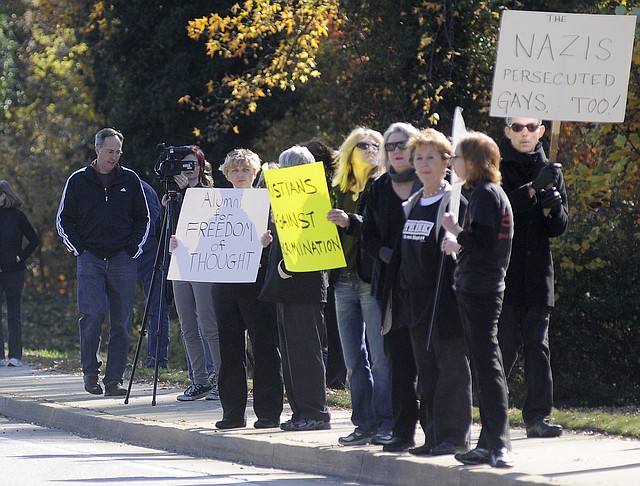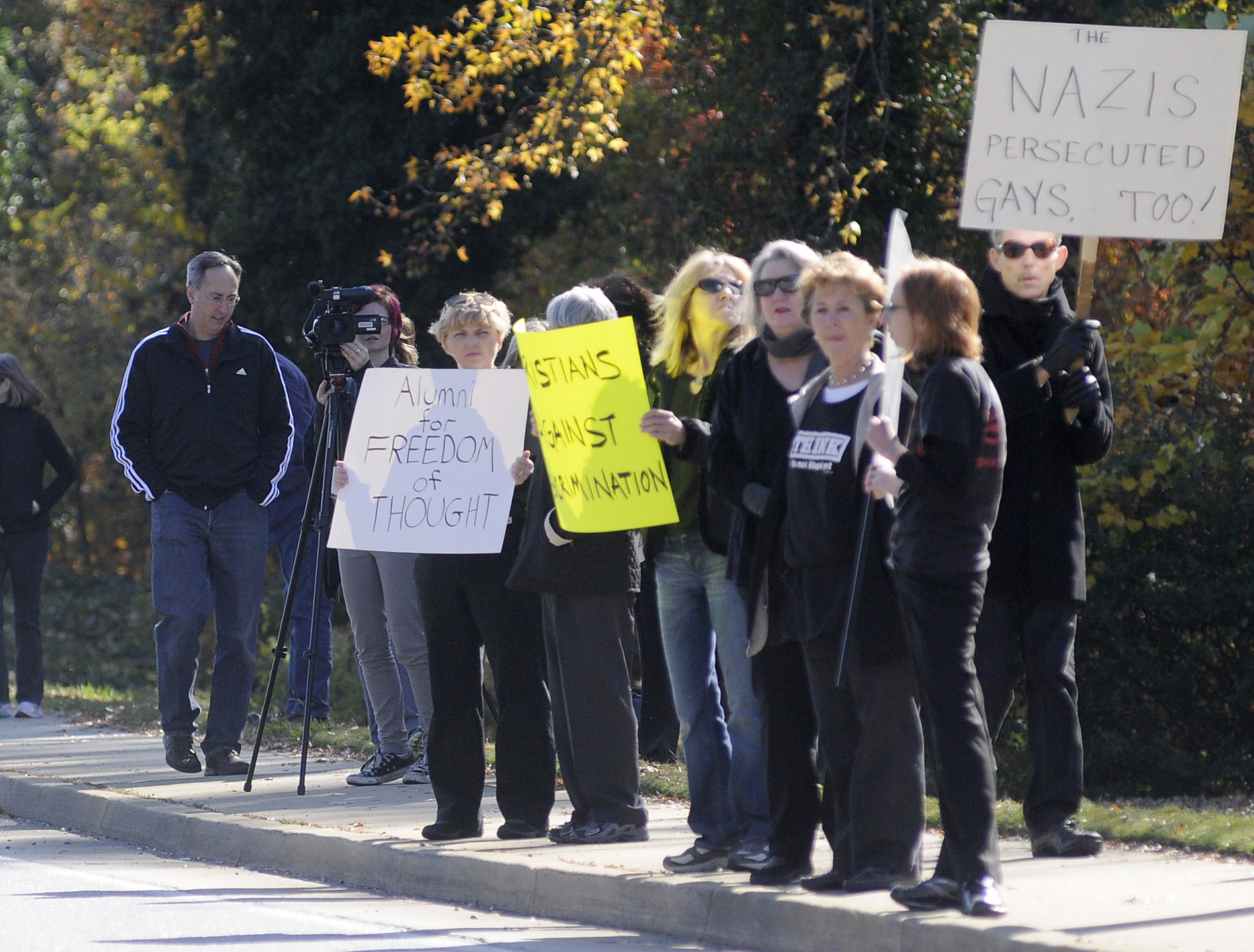Georgia's Shorter University to make staff sign 'statement of faith' pledge
Sunday, November 20, 2011
ELSEWHERE ON THE WEBhttp://www.shorter.edu/about/news/2011/10_25_11_logo_statements.htmABOUT SHORTER UNIVERSITY• Established: 1873• Size: About 1,500 students and 200 employees. Many students come from Northwest Georgia, Southeast Tennessee and Northeast Alabama.• Location: Rome, Ga., about 50 miles south of Dalton and 70 miles northwest of Atlanta.• Motto: "At the crossroads of faith and learning."
ROME, Ga. - For decades, Shorter University has given students like Nick DiPillo, faculty member Ben Harris and former professor and alumna Betty Zane Morris a place to grow spiritually and academically.
But the new university president's requirement of a "statement of faith" - in essence a pledge requiring faculty members to promise they are not gay and will refrain from drinking alcohol except in their own homes - has alarmed many on campus, who say it infringes on personal freedoms and attempts to legislate morality.
"I reject as acceptable all sexual activity not in agreement with the Bible, including, but not limited to, premarital sex, adultery, and homosexuality," reads the statement.
It's just one sentence in a 270-word document that also requires faculty to be active members of a Christian church and to refrain from drinking in public - even having wine in a restaurant. But it is placing the small, respected liberal arts college in headlines across the country and squarely at the crossroads of faith and learning, as its motto says.
"This institution has been a Christian school for 138 years, and we never were asked to sign anything to make that happen," said Morris, whose husband and children also are Shorter alumni.
"Jesus couldn't be a teacher here now. He drank wine in public. He was a Jew, and he associated with disreputable people," said Morris, who taught communications at the school for 46 years.
University President Donald Dowless said Shorter's administration and board - most appointed by the Southern Baptist Convention and the Georgia Baptist Convention - knew there would be some opposition.
"We recognize there may be people who do not agree with this and, in good conscience, cannot sign it. We wish them well. We hope they will be receptive to it," Dowless said.
Those who cannot or will not sign the statement will not have their contracts renewed.
As a private school, Shorter is within its rights to require the pledge from its employees; a number of Christian colleges and universities in the Chattanooga region have similar statements of faith.
What's different is that Shorter never had such a requirement before, and it comes as homosexual relationships and gay rights have gained increasing visibility and traction in the media and in statehouses from New Hampshire to Hawaii.
To a number of students and parents, a Christian college suggests a moral code or set of values they prize. A number of Shorter students, alumnae and parents approve of the new statement of faith.
The Christian environment is why Gordon Lee High School senior and softball player Kendall Johnson, of Chickamauga, Ga., chose the school.
"I thought it would be a good, safe Christian environment. I want to focus on my studies, and I love the coach there," she said, "The [controversy] doesn't really matter to me."
But last week about 100 students and faculty members protested in front of the school, and a Facebook page about the subject has gathered 5,000 posts against the change.
Around the country, Shorter's statement is being touted as one more example of discrimination against gays and lesbians. It has made headlines from New York to California to Florida.
A CNN opinion article posted Wednesday used Shorter's pledge in a discussion about gay legislation. The piece said the statement of faith "underscored a staggering injustice: In 29 U.S. states, people can still be fired for being gay."
DiPillo, a piano major and sophomore from Summerville, Ga., fears that 75 to 80 percent of his friends in the performing arts and science departments and many members of the faculty will leave the university.
"The language [the administration has] used is so divisive," said DiPillo, who has been taking piano lessons at the college since he was 8 years old.
"This is who I am," he said, gesturing toward the "Hill," as the campus is sometimes called. "And in two or three weeks what I love is just gone. I can't focus on studies. It's hard to get an education with this going on around us."
DUELING BELIEFS
Shorter isn't the only campus rocked in recent years by a clash of faith and academics.
Last December, Belmont University in Nashville was caught in a firestorm after women's soccer coach Lisa Howe was given a choice of resigning or being fired because she told her team she was gay and that she and her partner were expecting a child.
Belmont had been affiliated with the Southern Baptist Convention until 2007, and continued touting itself as a "Christian community."
The controversy forced the school to re-examine its identity. In March, school officials recognized a pro-gay student group.
Some regional Christian schools already have lifestyle statements not unlike the one just adopted for Shorter.
Bryan College in Dayton, Tenn., has a similar statement, said Bradford Sample, the school's vice president of academics.
But Sample said there is a difference between Shorter and Bryan, named for William Jennings Bryan, who prosecuted John Scopes for teaching evolution in 1925.
"We haven't changed anything. Our Christian life standards have been there a long time. Since 1930," Sample said.
He said the change could be difficult for Shorter.
"Sometimes transitions don't work well," he said. "Coming in knowing [a standard] seems fair. If you are trying to change the culture, that could be very disruptive and for some employees even hurtful."
But Sample said the university doesn't shy from the topic of homosexuality, and it has been a subject at Bryan's Triangle forums.
"We try to be a campus that will talk about anything. We believe that homosexual sex is a sin. Simply being attracted to a same-sex person is not, in and of itself, a sin."
In Collegedale, Southern Adventist University's student manual forbids sex outside marriage and homosexual relations for students.
Dennis Plaisted, professor of philosophy and applied ethics at the University of Tennessee at Chattanooga, said many private and Christian schools have similar policies, either for faculty or students or both.
"It is within the bounds of the law," he said. "I think controversy arose [for Shorter] because it is a change."
But Plaisted said school officials and faculty have to think about their mission as a liberal arts college, as well.
"I have had classes where I taught about sexual ethics, and I feel there are obligations, especially at a public university, to examine issues - pros and cons," he said. "I try to lay a lot of considerations in front of students, and they make their own decisions."
CULTURE CHANGE
To Harris, DiPillo and others, the gay portion of the statement is the headline maker, but not the crux of a culture change they fear will diminish the school that has produced two Metropolitan Opera winners and an 85 percent student acceptance rate to medical schools.
"For me, my conduct should show my faith. Now I have to come up with a phony document to insert Baptist doctrine into opera training and singing. We're here to educate, not to have prayer at the beginning of each class," Harris said.
Harris is an instructor of collaborative piano and a vocal coach in Shorter's School of Fine and Performing Arts. He assumes that because he has spoken out, he won't get the option of signing the statement of faith when faculty contracts are extended in the spring.
Harris said if his contract isn't renewed, he and his wife and two small children will move to Texas to work on his father's ranch.
Some longtime administrators already have left the school since the new administration arrived. Though their departures didn't have anything to do with the new statement of faith, some worry it could hinder Shorter's ability to attract new personnel.
Stewart Orr, a business major and junior, said students and faculty had worked to schedule a question-and-answer information session.
"But the administration turned it into an ice cream social," he said. "It's not just what the statement says. It's the bullying way they're doing it, too."
The pledge hasn't yet been extended to students, but they say the attitude has.
"The message is if you don't think like what we do, you just need to go on and get out," DiPillo said.
Dowless said he welcomes discussion, but the university will not back down.
"It's really unreasonable not to expect a Christian university to promote Christian values," he said. "What unites us is our love for Jesus Christ. ... There is constant dialogue."
Carrie Fitzsimmons, a graduate and former employee of Shorter and a spokeswoman for the Chattanooga Creative Discovery Museum, said she can see both sides of the issue, but she supports the school administration's decision to add the statement of faith.
"It hurts my heart to see my alma mater get bad attention," she said. "I know this has come across as being very bigoted, but the faculty and staff there are anything but that way. I will still support them."

